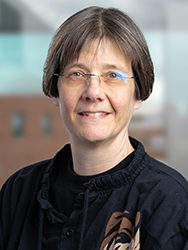Awards recognize academic advisory work, research leadership, and faculty excellence.
Three FRIB faculty members received awards from the Michigan State University (MSU) College of Natural Science (NatSci) at the NatSci Annual Meeting and Awards Ceremony, held 17 November at MSU’s STEM Teaching and Learning Facility. Faculty, staff, students, family, and friends attended the event, which annually recognizes NatSci faculty, staff, and students for their achievements and contributions.
- Daniel Bazin, research professor of physics at FRIB, received a 2023 Graduate Academic Advisor Award.
- Alexandra Gade, professor of physics at FRIB and in MSU’s Department of Physics and Astronomy and FRIB Deputy Scientific Director, received a 2023 Research Leadership Award.
- Remco Zegers, professor of physics at FRIB and in MSU’s Department of Physics and Astronomy, received a 2023 Outstanding Faculty Award.
The awards are based on nominations submitted from across the college and are evaluated by the NatSci Awards Committee and the Center for Integrative Studies in General Science staff.
“Congratulations to Daniel, Alexandra, and Remco for receiving these honors from the College of Natural Science,” said FRIB Laboratory Director Thomas Glasmacher. “Their commitment to the laboratory, the university, and especially their students is truly admirable and is a benchmark to which we should all aspire.”
Daniel Bazin

Bazin was recognized for his exceptional expertise in advising graduate students in NatSci. His award was given by the NatSci Student Advisory Council, which honors faculty or academic specialists annually.
“I felt very honored to receive this award, and frankly a bit surprised because I haven’t supervised very many students so far, although I have worked with many throughout my scientific career,” said Bazin. “There is always some self-doubt when advising students, so receiving this awards is a validation that my efforts are going in the right direction. It also reminds me that I need to keep this high standard in my tutoring. Working with the next generation of bright people and adapting to their talents and aspirations is a real blessing.”
Bazin earned a PhD in nuclear physics at the University of Caen in France. Previously, he was a tenured research physicist at the French National Center for Scientific Research (CNRS) at the Great Heavy-Ions National Accelerator (GANIL) in France. At FRIB, he leads the Active Target Time Projection Chamber (AT-TPC) research group, with the focus of using low energy reactions to study the structure of rare unstable nuclei that are difficult to produce in large quantities. Bazin is a fellow of the American Physical Society and an editor at Nature’s Scientific Reports.
Bazin’s research focuses on the study of exotic nuclei and the most efficient ways to unravel their properties. It is now well established that these radioactive nuclei have very different properties than the stable ones. Their structures, shapes, and modes of excitation can reveal new phenomena, such as haloes or molecular states for instance, that are essential to our understanding of the forces that bind nuclei together via comparison with theoretical models. He is focused on finding the most sensitive and relevant experimental methods to reveal these phenomena has been the focus of my career since its beginning. There are several “tools” available to study the properties of nuclei, but those he concentrates my research on all involve reacting nuclei together. When it comes to exotic nuclei however, they can only be produced in the laboratory as particle beams, and are usually the heavier particle of the pair. This inverse kinematics situation has important implications on the techniques used to detect and characterize the particles emitted after the reaction. The two techniques he is actively pursuing are nucleon removal reactions at high energy and low energy reactions using a novel type of detector called “active target.”
Alexandra Gade

Gade was recognized for her outstanding and impactful research and her internationally recognized leadership in her field. The award is based on prominent publications, funding, and other criteria that signify excellence and stature in her field.
“I am very honored to receive this recognition from the College of Natural Science,” said Gade. “Being part of the Facility for Rare Isotope Beams (FRIB) and the Department of Physics and Astronomy has enabled me to work with excellent students and research associates on new discoveries in the exciting field of nuclear science with rare isotopes.”
Gade received her PhD in physics in 2002 from the University of Cologne in Germany. She then moved to a postdoctoral appointment at the National Superconducting Cyclotron Laboratory (NSCL). In 2006, she became an assistant professor at Michigan State University (MSU), where she is now a professor of physics at FRIB and in the MSU Department of Physics and Astronomy. She has held various positions in science management at NSCL and FRIB since 2012. Gade is a fellow of the American Association for the Advancement of Science and also a fellow of the American Physical Society. She has been a member of the Nuclear Science Advisory Committee to the Department of Energy and the National Science Foundation. Gade has played a major role in assembling white papers on rare isotope research and defining critical instrumentation needed in the FRIB era. She has served on national and international committees, and she has earned several national and international awards.
Gade’s research focuses on the structure of atomic nuclei in the regime of very unbalanced proton and neutron numbers. Short-lived radioactive nuclei that contain many more neutrons than protons often reveal surprising properties: Their shape and excitation pattern as well as the energy and occupation of their quantum mechanical orbits by protons and neutrons is significantly altered as compared to stable nuclei. Her research group uses nuclear reactions to probe such changes in the nuclear structure. Since the nuclei of interest are short-lived and cannot be made into targets, the beam is made up of them. Her group uses different reactions to probe specific nuclear properties. These include scattering as well as reactions that remove or add a nucleon. Confrontation of the experimental results with theoretical predictions then often reveal surprises that point the way towards missing ingredients in the nuclear models that attempt to extrapolate into the unknown.
Remco Zegers

Zegers was recognized as a faculty member at MSU who has demonstrated excellence in the areas of teaching/mentoring, advising, research, publications, committee work, and public and professional service, as well as serving as a role model to student and colleagues.
“I am thankful for receiving this award and the support and efforts by the members of my research group, colleagues, and collaborators,” said Zegers. “I very much appreciate the activities in the College of Natural Science and the Facility of Rare Isotope Beams—the support and encouragement in both colleges is very special. I would like to highlight the role of students and postdoctoral researchers in our research accomplishments, as well as that of staff members at the College of Natural Science (NatSci) and the Facility of Rare Isotope Beams in support of forefront science: their efforts are very impactful. I see this award very much as a recognition of what we can do together as a team.”
Zegers earned a PhD in mathematics and natural sciences from the University of Groningen in The Netherlands in 1999. After graduation, he worked as a postdoc at the SPring-8 facility (focusing on the photoproduction of kaons) and the Research Center for Nuclear Physics (focusing on nuclear charge-exchange reactions) in Japan. In 2003, he joined NSCL and founded the charge-exchange research group. Zegers led the planning for FRIB’s High Rigidity Spectrometer and serves as that project’s scientific spokesperson. He is a Fellow of the American Association for the Advancement of Science and the American Physical Society.
His scientific research is in experimental nuclear astrophysics, specifically charge-exchange reactions. He is especially interested in supernova and the processes that create elements in the universe. He also studies processes that involve neutrinos and their astrophysical applications to understand how those particles interact with matter.
Michigan State University operates the Facility for Rare Isotope Beams (FRIB) as a user facility for the U.S. Department of Energy Office of Science (DOE-SC), supporting the mission of the DOE-SC Office of Nuclear Physics. Hosting what is designed to be the most powerful heavy-ion accelerator, FRIB enables scientists to make discoveries about the properties of rare isotopes in order to better understand the physics of nuclei, nuclear astrophysics, fundamental interactions, and applications for society, including in medicine, homeland security, and industry.
The U.S. Department of Energy Office of Science is the single largest supporter of basic research in the physical sciences in the United States and is working to address some of today’s most pressing challenges. For more information, visit energy.gov/science.
This story was originally published on the website for FRIB.
About the MSU Innovation Center:
The MSU Innovation Center is dedicated to fostering innovation, research commercialization, and entrepreneurial activities from the research and discovery happening across our campus every day. We act as the primary interface for researchers aiming to see their research applied to solving real-world problems and making the world a better place to live. We aim to empower faculty, researchers, and students within our community of scholars by providing them with the knowledge, skills, and opportunities to bring their discoveries to the forefront. Through strategic collaborations with the private sector, we aim to amplify the impact of faculty research and drive economic growth while positively impacting society. We foster mutually beneficial, long-term relationships with the private sector through corporate-sponsored research collaborations, technology licensing discussions, and support for faculty entrepreneurs to support the establishment of startup companies.
Is your company interested in sponsoring further FRIB or NatSci innovation at MSU? Click Here.
